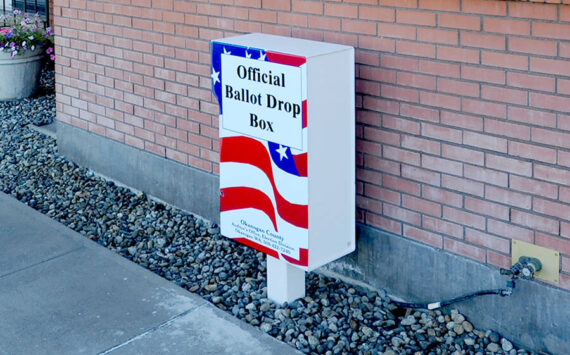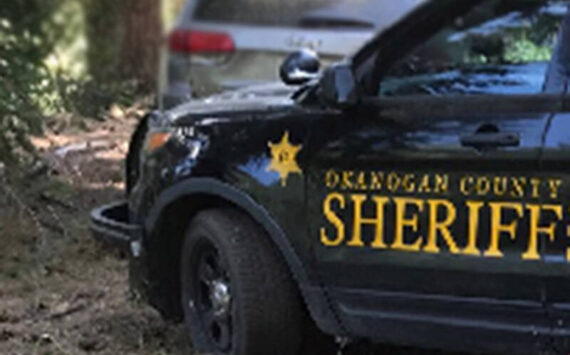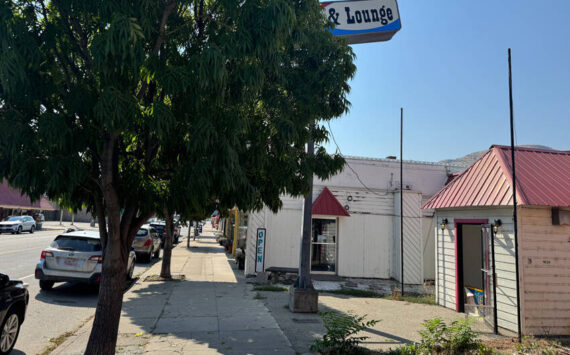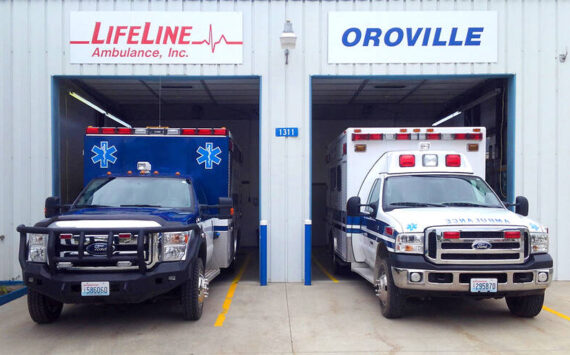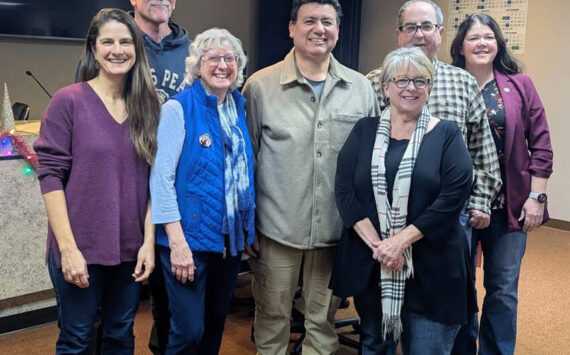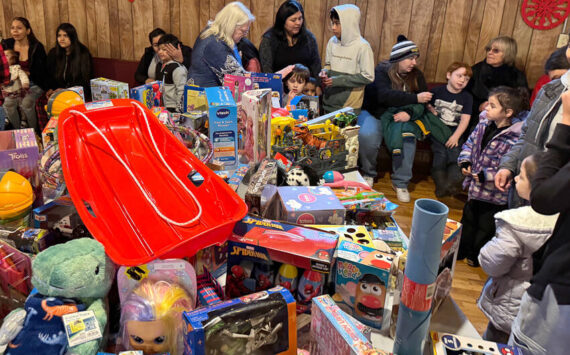
Okanogan orchardist Bob Blank said DOL inspectors were “out of line.”
OKANOGAN – Orchardists met in a special meeting of the Okanogan County Farm Bureau to listen to fellow growers who recently underwent federal inspections only to face hefty fines.
The U.S. Department of Labor does inspections of farms each year in the state, choosing a different county each year. This year it appears that it is Okanogan County’s turn in the barrel and so far the results have both angered and confused several orchardists. After requesting wage and employee information, agents spent most of their time inspecting orchard camps, as well as permanent housing, according to two growers who spoke before several dozen orchardists in the Okanogan County Commissioner’s Hearing Room. The inspections resulted in hefty fines for both growers – including fines for alleged substandard conditions with their permanent housing, which doesn’t fall under the DOL’s purview, according to the growers.
Geoff Thornton, who actually underwent the DOL inspection last October on day 50 of a 60 day harvest, said the inspectors have yet to give him an itemized list of just where he his family orchard were out of compliance.
Thornton, from Tonasket, introduced his wife Diane and their kids before telling his story. He said his orchard was the first in the county to undergo the process.
“When I get hit with a $14,000 fine it hurts them… my family,” he said. “We have many Hispanics working with us, we work with them, we are not just lording it over them, we work beside them,” Thornton said.
He said it was hard for a husband and wife to do all the paperwork “so if we’re a little out of compliance maybe it is because we do something few people do… we grow food for other people to eat.”
This is the first time Thornton has been inspected by the Department of Labor during his 23 years growing fruit. He said he has both respect and fear for the state Department of Labor and Industries, but didn’t realize the federal DOL had any interest in inspecting an operation of his size.
“When my own government comes and says ‘this guy is too far up the ladder we had better knock him down,’ that causes tears,” said Thornton, who was visibly emotional relating his experience with the federal inspectors.
He said he treated the inspectors politely and with respect and that he had been told on the phone that his workers were “really happy” working for him. He said his documents like I-9 forms and payroll sheets were up to date and gave credit to two of his Hispanic workers for keeping them in order. He said his required posters were also up on the poster board.
Thornton runs a six cabin labor camp across the river although he wasn’t licensed to do so. He said he had painted the cabins four times since 1984, that they all had new air flush toilets, that there was a new septic system and that all the showers were in order.
“At one time Okanogan County led the state in farm worker housing. We are getting certified for Global Gap to sell into the European Market and the rules are much tougher there and they say our housing is ‘inhabitable,'” he said.
Thornton said rather than trying to shut down operations like his the state has taken the attitude that they are going to help getting their license. He doesn’t feel the federal agency has the same goal of compliance through education.
“Since the fine from the Feds I have been buying my workers rent up at the Harvest Park in Oroville,” he said.
After going through the process Thornton said he had had enough, that he just gave directions to the orchard camp and went back to work. He said this was a mistake because the inspectors claimed that not all the toilets were supplied with toilet paper and there were not enough fire extinguishers.
Thornton said this was a lie on the inspectors’ part as his wife had just double checked to make sure that each cabin was so supplied and equipped minutes before the inspectors got there.
They also looked at his rental house where an employee with the PUD lineman had been living year around for the past four years until recently. He was now renting it to a Hispanic couple. According to Thornton the DOL has no jurisdiction to inspect permanent housing, but they did so anyway.
“I could rent that house to a Caucasian and they wouldn’t have cared. They’ll take jurisdiction where they don’t have it,” warned Thornton.
After the inspection the Thorntons got the fine and went to a lawyer to appeal and eventually agreed to settle for $6800 even though they still didn’t have an itemized list of violations so they could come into compliance.
“I cried and lost sleep on many nights and that’s my thanks for being an American farmer,” he said.
Bob Blank, an orchardist for 35 years farms 135 acres in the Okanogan area. He said his observation was on the surface the inspections seemed calm and undramatic.
“I have a labor camp and a lot of Hispanic workers with us that come back every year. One of the reasons they like it is for the housing,” said Blank, who is licensed to run his own orchard camp.
Many of the cabins in the camp are refurbished motel units that he provides for free to his workers.
“The government has made having housing units a lot stiffer than what I’d need if I was renting them out. That’s okay because we need the housing,” he said.
Blank said the inspectors made an appointment, went over his I-9s, talked to the workers and looked at the housing.
“In the sit-down in my office the inspectors said the screen doors didn’t have spring to return them into the closed position. I had to explain that they were built into the hinges and they worked automatically to close the doors. Then they said ‘well one of your workers has it propped open.’ I tried to explain that it was a cultural thing,” said Blank.
The orchardist also said he was questioned about his occasionally giving workers a ride to one of his orchard blocks. He said he didn’t provide transportation but would sometimes pick up workers if they were heading in the same direction.
“You could be financially liable if something happened they said. I said that’s why I carry liability insurance. In my opinion they were trying to set a labor negotiation agenda. They wanted me to declare things to set me up for things that are not any of their business,” said Blank.
“These people are way out of line and these fines are way out of line,” he said.
Both orchardists said the federal inspectors should be like other government agencies and educate the grower on how to comply, rather than acting like the regulations are a secret. They also said there should be a grace period of 10 days to correct any violations before a fine is given.
“The state L&I loves to have inspectors give out a check list because this gets people to know how to comply,” said Dan Fazio, with the Washington State Farm Bureau. “It appears the Department of Labor said ‘no, we don’t want you people to know how to comply.'”
One of the suggestions for growers that came out of the meeting was to tell the inspectors that they needed a warrant before coming on their property. It was also suggested that growers make sure they are in attendance throughout the inspections and videotape and tape record the inspection wherever possible.
Other suggestions included: 1.) Have a witness present; 2.) Request details of any fine; 3.) Ask which exceptions are available; 4.) Request a copy of all inspection notes; 5.) Request information on your appeal rights and 6.) Write a statement of what transpired immediately after the inspection.
Fa
zio said that technically the farmers can require the DOL inspectors get a warrant, but this will only delay matters because they have the right to inspect under the Open Field rule. He said that last year the inspectors hit Skagit County and the Farm Bureau got the jump on the situation.
Those farms that have under $500,000 gross annual income are exempt. It was suggested that this number should be raised to twice that amount.
Representatives from U.S. Senator Maria Cantwell’s and U.S. Representative Cathy McMorris’ office were also on hand. They said they would take what they heard back to their legislators to see if they could help the local farmers.
